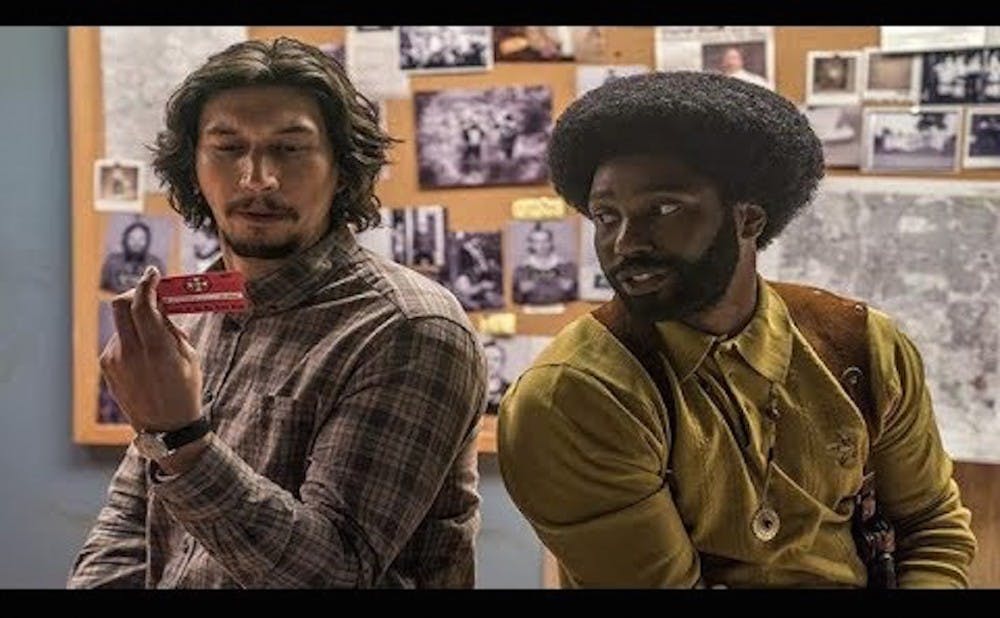Spike Lee has been known for over three decades for his brash, unapologetic race-related films, challenging his audience to dive deeper into today’s issues through brilliant writing and direction. “BlacKkKlansman” tells the story of Ron Stallworth (John David Washington), who becomes the first African-American detective in the Colorado Springs Police Department.
From Ron’s initial interview to join the force, we must face his reality as a black man, when he is asked to remain calm if other detectives harass and profile him — to which he reluctantly agrees. He immediately is assigned to the records room, but eventually goes undercover to infiltrate a speech by civil rights leader Kwame Ture (Corey Hawkins). These scenes highlight the impact of the Black Power movement and the distrust of police in the African-American community. These feelings are characterized within the Colorado College black student union president Patrice (Laura Harrier), from whom Ron hides his status as an officer, even as they become closer. Patrice is also stopped while taking Ture back to his hotel and hit on by the corrupt, racist officer Andy Landers (Frederick Weller), reflecting the still-relevant controversy over the frequent traffic stops of African-American drivers.
Detective Stallworth eventually takes matters into his own hands by contacting the Colorado Springs Ku Klux Klan and setting up a meeting. The department then launches an undercover operation into the Klan, with Stallworth being the voice and a Jewish-American detective, Flip Zimmerman (Adam Driver), as the face. Zimmerman faces hurdles in his interaction with the Klan, most notably from the skeptical Felix Kendrickson (Jasper Pääkkönen), who goes as far as to try to force Flip to take a Jewish lie detector test and continually tries to call Flip’s identity into question. The film crescendos toward the visit of Grand Wizard David Duke (Topher Grace).
While John David Washington does not shine as Ron from start to finish, his performance grows and defines itself as the film goes on, allowing him to step decisively out of the shadow of his father, legendary actor Denzel Washington. Washington’s Stallworth and Driver’s Zimmerman play well off of each other, causing the audience to invest more into both characters and making the two characters’ one identity feel more natural. Pääkkönen’s harsh brilliance illuminates the darkest moments of the film, providing the archetypal villain that you love to hate, while also providing a sense of realism to the film, as he realizes that not everything seems right with Ron Stallworth.
The short appearances by Corey Hawkins as Kwame Ture and the renowned singer, actor and civil rights leader Harry Belafonte strengthen the passion of the film and give the civil rights background real force, allowing the film to be just as much about the African-American community as it is about Washington’s Stallworth. Harrier’s Patrice is never given enough of a “moment” to really shine, but serves well as the stock anti-police African-American activist that juxtaposes Stallworth, who, for much of the film, is viewed as “complicit” to the police force’s racism. Topher Grace, of “That 70s Show” fame, creates a goofy, inept version of Klansman-turned-politician David Duke, delivering some of the funniest (and most disturbing) moments of the film.
Various critics have insinuated that “BlacKkKlansman” does not have the passion and advocacy Lee’s films are known for; however, it is abundantly apparent that Lee’s passion is front and center across the entirety of the film. Does the film paint the police as the enemy of the African-American race? No, not at all, and that is for the best, as it mostly portrays a mutually beneficial relationship between the police and civil rights, with a few blaring exceptions. Nevertheless, despite the claims of Boots Riley, director of the highly controversial “Sorry to Bother You,” Lee’s film is brilliant and does nothing to quiet the civil rights aspect of the story, instead raising it up in a way that makes it a focal point of the film.
The most insightful aspect of the film comes in how Lee is able to weave in the past with the present. Throughout the film, he addresses the topics of race relations, police brutality, sexual harassment, and preservation of the past, four controversial issues that are widely discussed to this day. The film draws parallels between the toxic politics of David Duke to the close-mindedness of politicians today, with a particular line discussing that the detectives could never imagine a David-Duke-like persona becoming president — an obvious nod to Lee’s disdain for Donald Trump.
By the end of the film, Lee’s point is clear: If we pretend that racism has been eradicated, it will keep coming back and haunting our world, so we must actively combat these horrendous ideals. Racism continues to run rampant in our society, as racial injustice continues to be featured heavily in our everyday news. We must not ignore the destructive nature of such actions, as Spike Lee and “BlacKkKlansman” clearly demonstrate.
Get The Chronicle straight to your inbox
Signup for our weekly newsletter. Cancel at any time.

